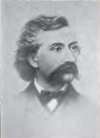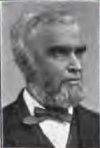The Surrender
On September 20th, it was not long after the fighting with the hemp bales that a white flag of surrender was raised by the Federals inside of their entrenchments. This caused considerable confusion and many battle participants had much to say about this white flag of surrender. Previously, Price had demanded the garrison surrender, but had been refused.
 Captain Joseph A. Wilson later described what he knew of the initial surrender flag:
Captain Joseph A. Wilson later described what he knew of the initial surrender flag:
"... white flag appeared in the Home Guard Camp, just west of the college building. Gen. Price, seeing one or both flags from the third story of his headquarters building, sent Col. Thomas L. Snead, A. A. G., to the fort to inquire their object. Mulligan, who had just been informed of the flag raising, replied: "I don't know, unless you fellows have surrendered, for I have no idea of giving up," or words to that effect."
 In a lecture, Union Colonel James Mulligan described what he knew about the surrender:
In a lecture, Union Colonel James Mulligan described what he knew about the surrender:
"[On September 20th] our cartridges were now nearly used up, many of our brave fellows had fallen, and it was evident that the fight must soon cease, when at 3:00 o'clock an orderly came, saying that the enemy had sent a flag of truce. With the flag came a note from Gen. Price asking why the firing had ceased. I returned it, with the reply written on the back, saying: "General, I hardly know, unless you have surrendered." He at once took pains to assure me that such was not the case. I afterwards discovered what the trouble was. A lily-livered man, a major by courtesy, ensconsed under the earth-works, out of sight, had raised a white flag. Twice he had been threatened with death if he did not take that cursed thing down; but the third time his fears overcame his discretion and made for a moment a brave man of him, and he hoisted the flag over the breast-works on a ramrod.
"The ammunition was about gone, there was no water, we were out of rations, and many of the men felt like giving up the post, which it seemed impossible to hold any longer. They were ordered back to the earth-works and told to use up all their powder, and then defend themselves as best they could, but to hold their place. They obeyed, silently and grim. Without a murmur they went back and stood at their post, only praying that the enemy would approach so near that they might use the soldier's weapon, when his powder fails--the bayonet. Then a council of war was held in the college and the question of surrender put to the officers, and a ballot was taken--only two of the six votes were cast in favor of fighting on, and when the flag of truce was sent out. With our surrender many of the brave fellows shed tears. And so the place was lost."
 Union Major R. T. Van Horn described the surrender from the perspective of the Federals:
Union Major R. T. Van Horn described the surrender from the perspective of the Federals:
"As to the hoisting of the white flag: It seems to have been the act of a subordinate officer, and unauthorized, but before discovered had so controlled the action of both armies as to make it a necessity. I have read the accounts of both Gen. Price and Col. Mulligan, and they agree in this respect. It was given out on the Union side as the act of an officer by the name of Becker. ... As to the exchange of prisoners: Gen. Price not being at that time in the Confederate service but in chief command of the "State Guard," a cartel could be arranged without going to Richmond, so the Lexington prisoners were exchanged for those of Camp Jackson."
These were the terms of surrender as described by Captain Joseph A. Wilson of the Missouri State Guard:
"Officers and men, as prisoners of war, gave parole not to take arms against the Confederate government until regularly exchanged. Arms were stacked within the works and the men marched out and returned to their homes under their own officers, retaining private property, such as clothing, etc. Officers retained private horses and side arms. All provisions, stores, ammunition, tents, wagons, arms and other public proper were turned over to the victorious army. There were provisions and other stores within the works to last through a siege of six months, but water had become very scarce. This was undoubtedly a potent factor in leading to the surrender. Indeed, the Federals claim that they would have held out until relieved, but for the want of water This is, to say the least, doubtful, as they were outnumbered nearly four to one and the place could have been taken by storm at any time."
Back: Hemp Bales
Next: Epilogue
